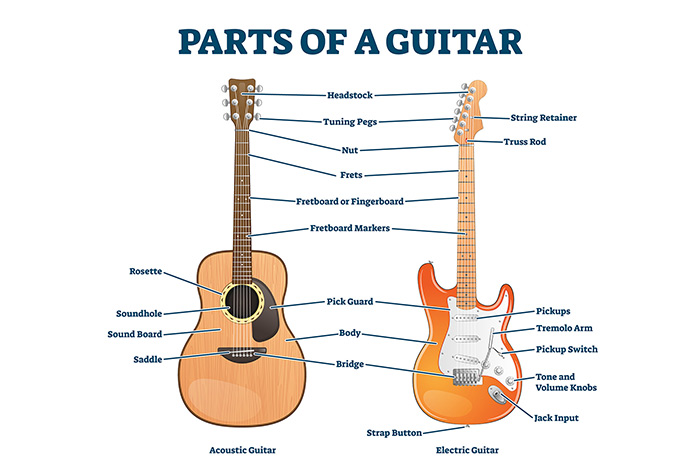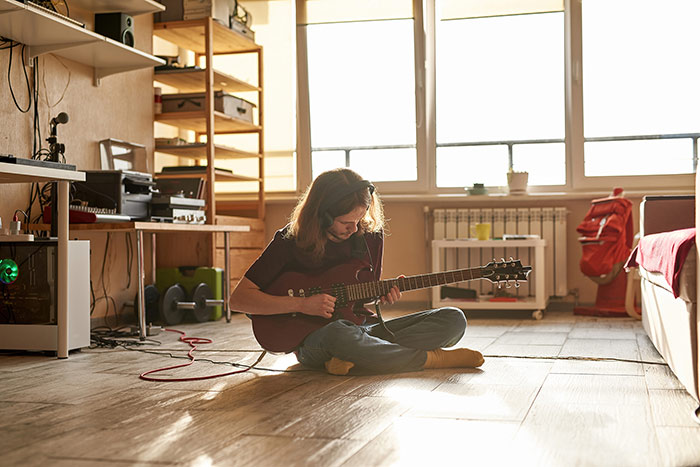It’s never an easy thing to do, but handing your precious guitars and instruments over to the baggage handlers at the airport is one sure way to boost the anxiety in any musician. But what steps can you take to ensure the safety of your prized possessions? Here are a few tips to keep your guitars safe during air travel.
A Good Case
Rule #1, when travelling by air with your guitar, is to make sure you fly it in a good case. Hard cases are usually the best bet, and even going the extra mile from the flimsy case that your guitar came into, getting something extra sturdy will guarantee even more protection. Something by brands such as SKB or Pelican offers a durable enclosure for your prized instruments.
Personally, I have always tended to go for a Mono soft guitar bag, which is somewhere between a gig bag and a hard case. The Mono cases are designed to absorb any impact through their water resistant outer walls, and also have a headstock and neck suspension system inside.
I have always flown my guitars in one of these cases, including a Gibson ES-335 and several acoustic guitars, which are typically more fragile than a Fender Strat for example. I find these cases a little more convenient for commuting around town once at your destination, as they have backpack style straps to make them easy to carry and also plenty of pockets for all of your accessories.
De-tune the Strings
One tip to save yourself a re-string once you get to your destination is to de-tune your guitar strings before you send it off through the luggage belt.
This will prevent any strings from breaking mid flight, as the air pressure on the aeroplane can cause strings to break if not loosened beforehand.
AirTag
As I unfortunately had to find out last year on my travels through Europe, an Apple AirTag or something similar is a must when flying not only your guitars, but any luggage!
We all know how unpredictable baggage handlers and airlines can be, so having that piece of mind knowing exactly where your guitar is can go a long way to helping you sleep at night if it hasn’t shown up at the other end of your travels at the baggage collection belt.
This can also speed up the process of having the airline return the luggage to you, as you can send them a screenshot of the exact location of where it was left.
Name Tag
Also equally important if your guitar becomes lost, a name tag with your name, address, phone number, and email will go a long way in having your precious instrument returned to you.
“Fragile” Sticker
I always make sure that I plaster the outside of my guitar case (and also my pedalboard case/in-ear unit road case) in fragile stickers and fragile tape to ensure that the baggage handlers know to not throw my instruments around.
I would personally recommend purchasing your own fragile stickers ahead of your flight and putting these on yourself, rather than using the airlines fragile stickers at the airport, as using their stickers can void the airline of any responsibility should there be (touch wood) any damage to your guitar.
This is why you will sometimes be asked to sign something should you accept their offer of a fragile sticker at the check in desk, or there can also be a clause surrounding this in the fine print.
Insurance
Although we always go to every measure possible to ensure the safety of our guitars during air travel, accidents do happen, so it’s important to be covered for this should it happen.
Many companies offer basic instrument and musical equipment insurance which you can take out for just one guitar, or your entire studio. As a professional musician I think that this is a must have, as if your guitar is seriously damaged or even temporarily lost this can prevent you from doing your job and earning your income.
In most countries the premium for this insurance will also be a tax write off (although be sure to check with your accountant in your country)!
Here in Australia I use a company called Marsh Insurance, who specialise in musical equipment cover, although in the past I have used a company called Duck For Cover who offer low premiums for basic instrument insurance (and other things like public liability insurance).
Previously in the UK I had my gear insured through the Musicians Union (MU) who offered gear insurance as well as many other services (including contract advice) as a part of their annual membership fees.













